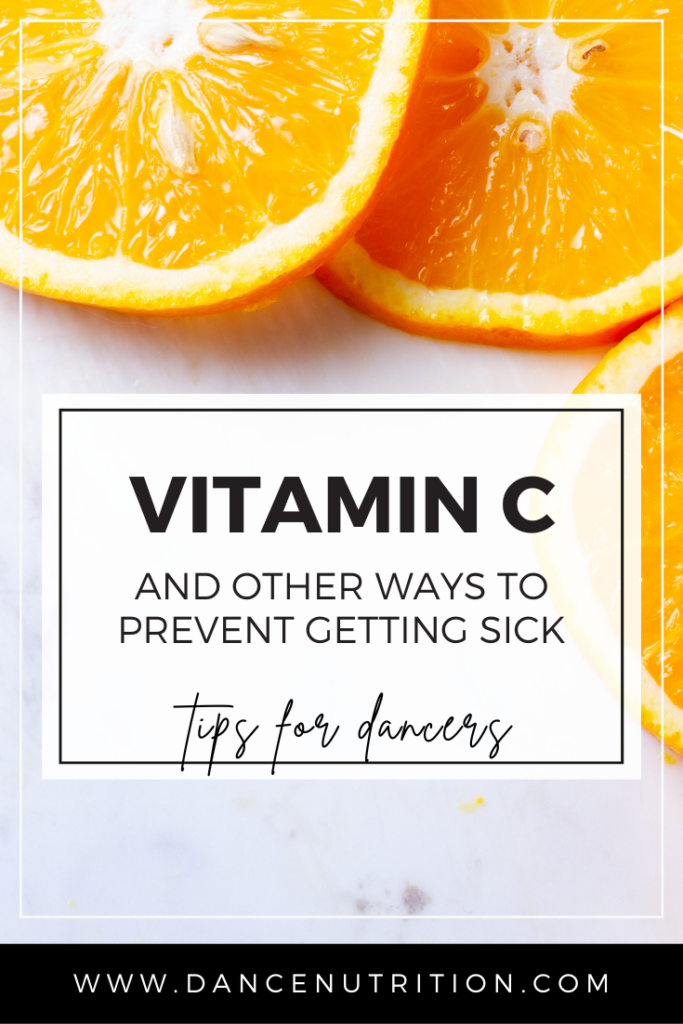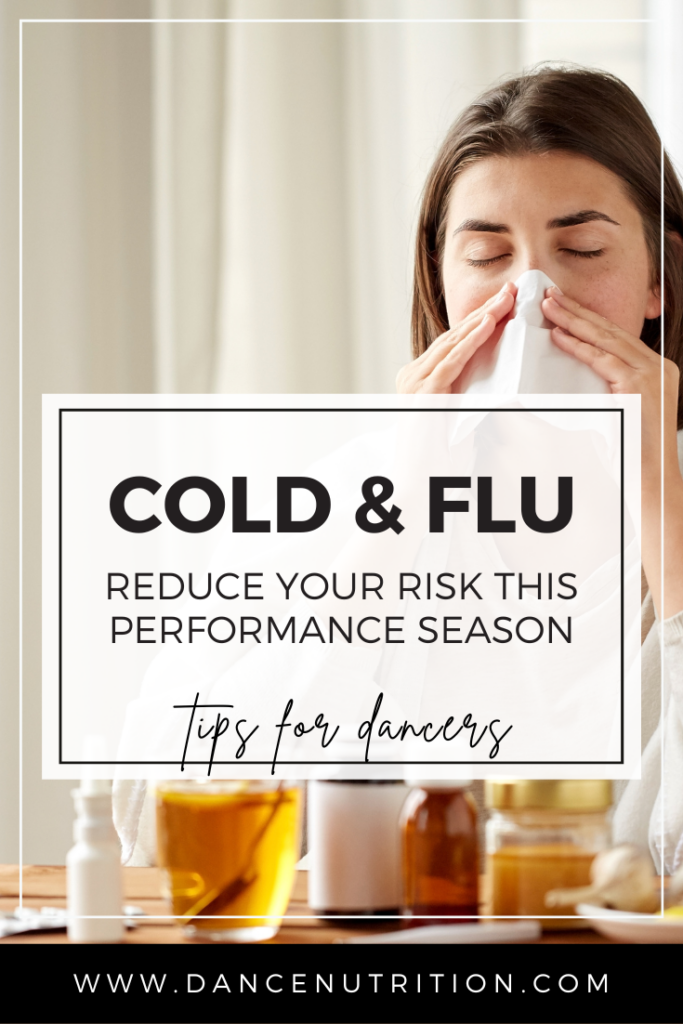How to not get sick as a dancer
With the change of the seasons comes a challenge that most dancers aren’t quite ready to face: the common cold. Not only are you likely to be navigating an over-booked schedule as you move into winter performances and the holiday season, but colder temperatures may promote the transmission of viruses and indirectly increase your risk of getting sick. In this blog post, we’ll uncover critical steps to take to reduce your risk of getting sick this performance season.
The role of Vitamin C
Vitamin C is a nutrient often touted for its benefits in immune support. However, it must be supplied through our diet since the human body is not able to create nor store this vitamin on its own. The benefits of vitamin C go beyond reducing your sniffles. Vitamin C strengthens collagen, which is a major component of skin health and tissue healing. For dancers specifically, vitamin C also acts as an antioxidant, preventing cellular stress and damage; especially important for dancers, as muscles are constantly engaged and strained.
With so much to give, vitamin C is commonly a supplement of choice for many dancers. However, when taken throughout the cold season, vitamin C supplements may only modestly reduce symptoms of colds. There is no solid evidence supporting the use of Vitamin C supplements to prevent colds. Vitamin C is found in many fresh fruits and veggies. Foods high in vitamin C include most fresh fruits and veggies, especially citrus fruits, berries, and tomatoes. Increasing your intake of foods high in Vitamin C can help support your immune system. Here are two suggestions:
#1: Add citrus to marinades, dressings, and sauces
Foods high in vitamin C include most fresh fruits and veggies, especially citrus fruits. Luckily, citrus is in season during the winter months making grapefruit, clementines, lemons, and limes easily accessible, affordable, and delicious. Keep a bowl of these on your kitchen counter to snack on or to utilize when cooking. Kiwifruit, mangos, and plums are a few other Vitamin C-containing fruits to add to your meals.
Optimize your plate: Mix in a splash of lemon with tahini or olive oil and top roasted vegetables or salad to add extra flavor and vitamin C.
#2: Bump Up The Fresh Produce
Vitamin C is both water-soluble and sensitive to heat. Boiling veggies can cause as much as a 50% reduction in a food’s vitamin C content. If choosing to cook your veggies, then choose dry-heat cooking methods such as baking and roasting. Also, the vitamin C content in many fruits and vegetables begins to decrease with long storage times. Aim to enjoy your product within 3 to 4 days of purchasing to maximize your intake.
Optimize your plate: Kiwi, berries, tomatoes, bell peppers, potatoes, spinach, and broccoli are wonderful sources of Vitamin C that can be eaten fresh or prepared in salads.
The benefit of probiotics
Emergent research associates our gut bacteria with countless benefits, including their role in immunity. Food sources of probiotics include yogurt, kombucha, kefir, kimchi, and sauerkraut. Here’s the catch: you’ll want to supply probiotics with their own food source to promote their growth
If you find yourself becoming bored with vegetables, then add fermented foods such as kimchi and sauerkraut into your meals. These two products are made from cabbage, a naturally rich source of vitamin C and fiber! A bonus? Fermented foods will boost your intake of naturally-occurring probiotics. Probiotics are healthy organisms (think of them as friendly bacteria) living along our digestive tract. Emergent research associates our gut bacteria with their role in immunity.
Optimize your plate: Prebiotics are fibers from all plant-based foods that supply energy for probiotics. Some specific foods containing prebiotics include apples, barley, flaxseeds, onions, garlic, oats, bananas, grains (like bulgur and wheat berries), leeks, and leafy greens.
A food first approach
Before reaching for supplements, consider the role that a varied diet plays in building immunity. Eating a variety of foods, especially plant-based foods, provides us with powerful nutrients to help battle the cold. This is the best way to arm your immunity, especially during these next few (shivery!) months.
Optimize your plate: Zinc is found naturally in foods such as shellfish, meat, chicken, beef, and fortified breakfast cereals.
Looking beyond your plate
Prioritizing good hygiene practices can help to lessen and prevent the spread of germs. This includes regular handwashing with soap and water for at least 20 seconds, and carrying hand sanitizer for times when soap and water are not readily available. You can also avoid touching your face, particularly eyes, nose, and mouth area, as this can transfer germs.
For dancers who already feel sick, practice social distancing to prevent spreading the illness to others. This may mean temporarily stepping back from rehearsals and performances until fully recovered. Luckily in a post-pandemic world, online dance classes are available if you’re stuck at home and still craving movement.
A reminder for studios
Keeping dance spaces clean and sanitized is essential for minimizing the spread of germs among dancers. Regularly disinfecting commonly touched surfaces such as dance floors, barres, and equipment can help reduce the risk of infection. Providing tissues, disinfectant wipes, and hand sanitizer in rehearsal spaces encourages dancers to maintain cleanliness and hygiene.




